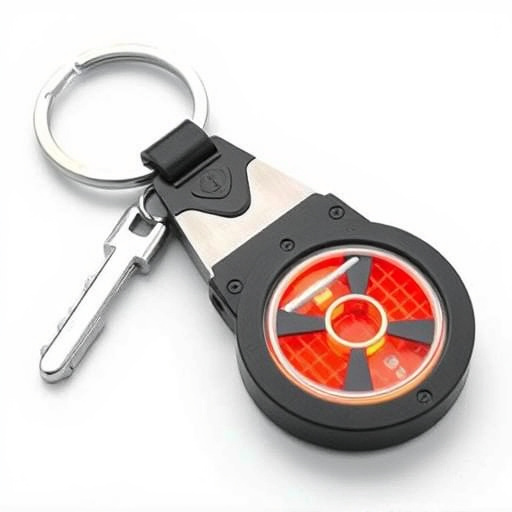Discreet keychain protection tools have gained popularity as a convenient and effective personal defense option. To legally carry these compact devices, citizens must understand their state's regulations, prioritizing discretion, robust construction, and innovative features. Staying informed about local laws empowers individuals to protect themselves in crowded areas while avoiding legal issues. These tools have proven effective in deterring attackers and enhancing safety in urban settings, offering peace of mind with minimal visibility.
“In today’s unpredictable world, personal safety is paramount. The defensive keychain, a compact and discreet self-defense tool, has gained popularity as a legal carry option. This comprehensive guide explores the intricate web of guidelines governing these devices, ensuring users remain compliant with state laws. From understanding the legal framework to selecting the ideal tools, this article equips readers with knowledge. We navigate state-specific regulations, offering best practices for responsible carrying. Additionally, real-world case studies shed light on the effectiveness of defensive keychains in diverse scenarios.”
- Understanding Defensive Keychain Legal Carry Guidelines
- Choosing the Right Discreet Keychain Protection Tools
- Navigating State-Specific Laws and Regulations
- Best Practices for Carrying a Defensive Keychain Legally
- Case Studies: Real-World Applications of Defensive Keychain Use
Understanding Defensive Keychain Legal Carry Guidelines
The world of personal defense has evolved, and one innovative tool gaining popularity is the defensive keychain. These compact protection devices offer a discreet way for individuals to enhance their safety while on the go. Understanding the legal framework surrounding their carry is essential for responsible citizens looking to empower themselves. Each state has its own set of regulations, dictating where and how these defensive keychains can be legally possessed.
Knowing the local laws ensures users stay within the boundaries of the law while benefiting from the convenience and discreteness of these keychain tools. With proper research, individuals can arm themselves with knowledge, ensuring they have the right to protect themselves effectively without compromising legal integrity.
Choosing the Right Discreet Keychain Protection Tools
When selecting defensive keychain legal carry guidelines, it’s crucial to choose discreet tools that blend seamlessly into your everyday accessories. These devices should be compact and designed with modern aesthetics in mind, ensuring they don’t attract unnecessary attention. Look for keychains with innovative features like built-in flashlights or tactical tools, which offer versatility without sacrificing discretion. The right choice will provide peace of mind while maintaining a low-profile presence.
Consider materials that are durable yet lightweight, such as high-quality stainless steel or advanced polymers, to ensure your keychain can withstand everyday wear and tear. Additionally, some models feature advanced locking mechanisms and heat-treated metal components, enhancing their reliability in critical situations. By prioritizing discreet design and robust construction, you’ll have a reliable self-defense tool that remains hidden yet readily accessible.
Navigating State-Specific Laws and Regulations
Navigating state-specific laws and regulations is a crucial step in understanding your rights and responsibilities regarding defensive keychain legal carry guidelines. Each state has its own set of rules governing the use and possession of self-defense tools, including discretely designed keychain protection devices. It’s essential to research and comply with local legislation to ensure legal carrying and effective personal safety.
States vary widely in their definitions of what constitutes a legal self-defense tool and the conditions under which it can be carried. Discreet keychain protection tools, often featuring built-in pepper spray or stun functions, must adhere to these regulations. This may involve permitting specific types of devices, setting restrictions on capacity and output, and defining where and how such tools can be transported. Staying informed about these nuances is key to avoiding legal complications and effectively utilizing your defensive keychain protection tool as intended.
Best Practices for Carrying a Defensive Keychain Legally
When carrying a defensive keychain for legal protection, discretion is key. Opt for compact, lightweight tools that blend seamlessly with your everyday carry items. The best discreet keychain protection tools offer robust self-defense capabilities while maintaining a low profile. Consider options like high-quality multi-tools or specialized pepper spray keychains designed to be easily accessible yet minimally visible.
Ensure the functionality of your chosen device through regular practice and familiarization. Familiarity with its operation will enable you to deploy it swiftly and effectively when needed, enhancing your overall safety. Remember, legal carry guidelines vary by state, so stay informed about local regulations to ensure compliance and maximize your peace of mind while carrying a defensive keychain.
Case Studies: Real-World Applications of Defensive Keychain Use
In real-world scenarios, defensive keychains have proven to be valuable tools for personal safety and self-defense. Case studies highlight their effectiveness in various situations. For instance, in crowded urban settings, where assaults can occur suddenly, a discreet keychain defense tool can provide a sense of security. The compact size allows individuals to carry it effortlessly without drawing unnecessary attention, making it an ideal companion for navigating bustling streets or public transit hubs.
These keychains are designed to offer quick and effective protection. Research shows that the mere presence of such a device can deter potential attackers, as they may perceive it as a sign of preparedness and willingness to defend oneself. This psychological factor, coupled with the physical capability of these tools, has led to numerous positive outcomes, ensuring individuals feel more empowered and safer in their daily lives.
In conclusion, defensive keychains can be a powerful and discreet self-defense option when carried legally according to state guidelines. By understanding the legal carry rules, selecting the appropriate tools, and adhering to best practices, individuals can protect themselves in various situations. Navigating state-specific laws and staying informed about real-world applications through case studies ensures responsible and effective use of discreet keychain protection tools.
